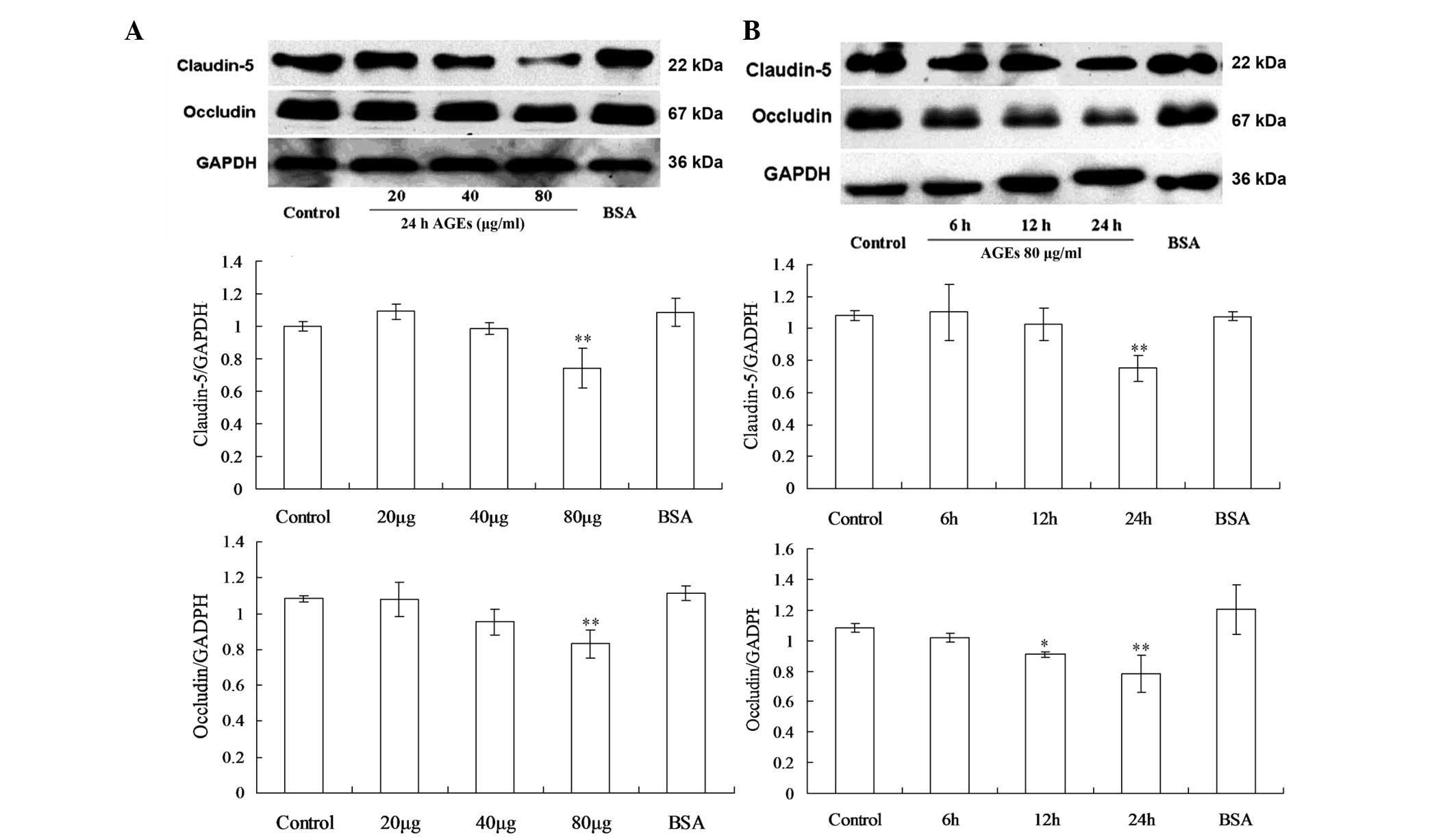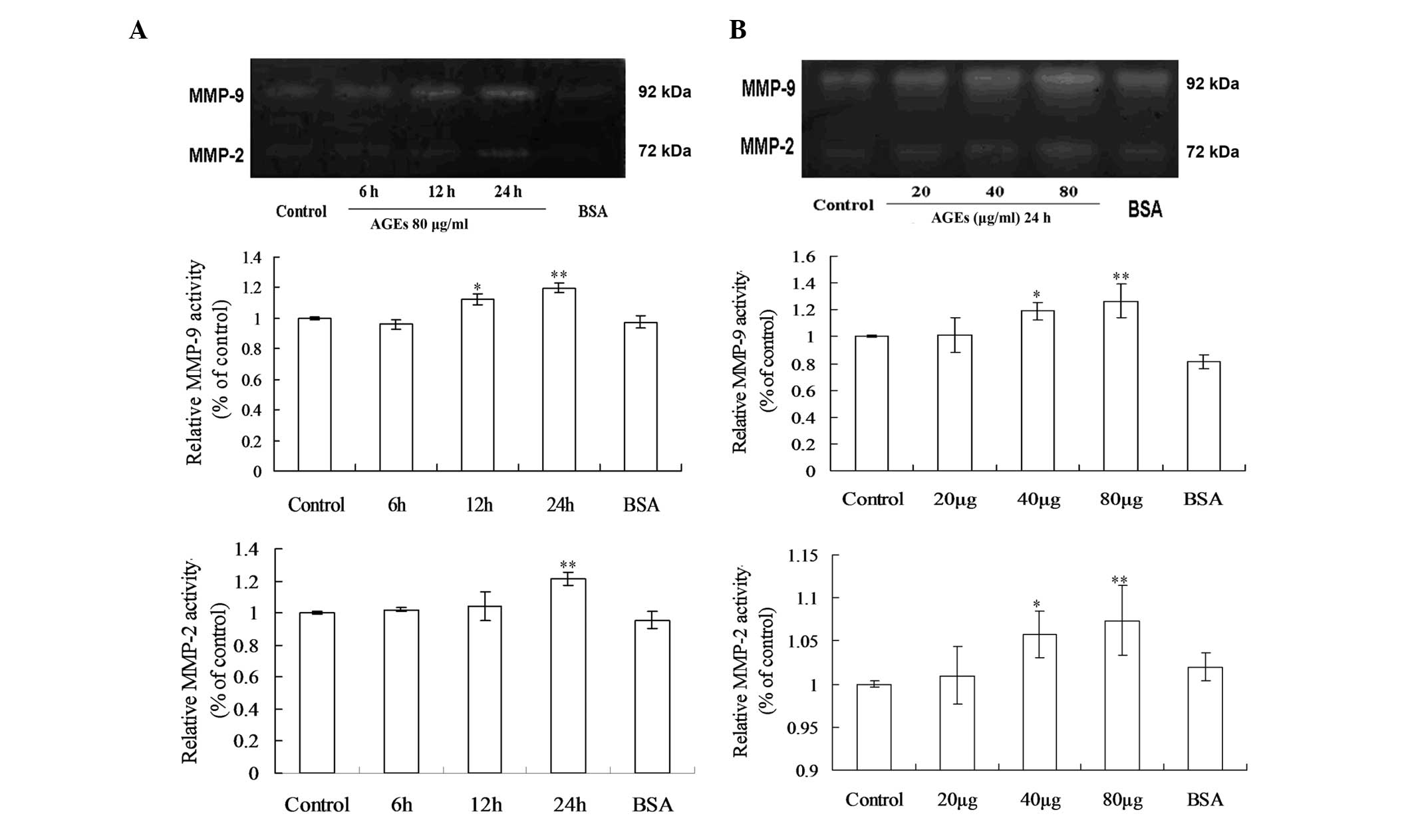|
1
|
Bhonsle HS, Korwar AM, Chougale AD, Kote
SS, Dhande NL, Shelgikar KM and Kulkarni MJ: Proteomic study
reveals down-regulation of apolipoprotein A1 in plasma of poorly
controlled diabetes: a pilot study. Mol Med Rep. 7:495–498.
2013.
|
|
2
|
Tooke JE: Microvasculature in diabetes.
Cardiovasc Res. 32:764–771. 1996. View Article : Google Scholar : PubMed/NCBI
|
|
3
|
Bonnardel-Phu E, Wautier JL, Schmidt AM,
Avila C and Vicaut E: Acute modulation of albumin microvascular
leakage by advanced glycation end products in microcirculation of
diabetic rats in vivo. Diabetes. 48:2052–2058. 1999. View Article : Google Scholar : PubMed/NCBI
|
|
4
|
Svensjo E, Arfors KE, Raymond RM and Grega
GJ: Morphological and physiological correlation of
bradykinin-induced macromolecular efflux. Am J Physiol.
236:H600–H606. 1979.PubMed/NCBI
|
|
5
|
Bi YL, Wu MF, Lu LX, Du F, Sun XT, Tang SF
and Xu GT: Functions of corneal endothelial cells do not change
after uptake of superparamagnetic iron oxide nanoparticles. Mol Med
Rep. 7:1767–1772. 2013.PubMed/NCBI
|
|
6
|
Leto G, Pricci F, Amadio L, Iacobini C,
Cordone S and Diaz-Horta O: Increased retinal endothelial cell
monolayer permeability induced by the diabetic milieu: Role of
advanced non-enzymatic glycation and polyol pathway activation.
Diabetes Metab Res Rev. 17:448–458. 2001. View Article : Google Scholar
|
|
7
|
Bonnardel-Phu E, Wautier JL and Vicaut E:
Advanced glycation end products are involved in microvascular
permeability changes observed in microcirculation of diabetic rats
in vivo. J Mal Vasc. 25:122–127. 2000.PubMed/NCBI
|
|
8
|
Soulis-Liparota T, Cooper ME, Dunlop M and
Jerums G: The relative roles of advanced glycation, oxidation and
aldose reductase inhibition in the development of experimental
diabetic nephropathy in the sprague-dawley rat. Diabetologia.
38:387–394. 1995. View Article : Google Scholar : PubMed/NCBI
|
|
9
|
Rojas A and Morales MA: Advanced glycation
and endothelial functions: A link towards vascular complications in
diabetes. Life Sci. 76:715–730. 2004. View Article : Google Scholar : PubMed/NCBI
|
|
10
|
Camici M: Renal glomerular permselectivity
and vascular endothelium. Biomed Pharmacother. 59:30–47. 2005.
View Article : Google Scholar : PubMed/NCBI
|
|
11
|
Beisswenger PJ, Makita Z, Curphey TJ,
Moore LL and Jean S and Jean S: Formation of immunochemical
advanced glycosylation end products precedes and correlates with
early manifestations of renal and retinal disease in diabetes.
Diabetes. 44:824–829. 1995. View Article : Google Scholar : PubMed/NCBI
|
|
12
|
Thrailkill KM, Clay Bunn R and Fowlkes JL:
Matrix metalloproteinases: Their potential role in the pathogenesis
of diabetic nephropathy. Endocrine. 35:1–10. 2009. View Article : Google Scholar :
|
|
13
|
Giebel SJ, Menicucci G, McGuire PG and Das
A: Matrix metalloproteinases in early diabetic retinopathy and
their role in alteration of the blood-retinal barrier. Lab Invest.
85:597–607. 2005. View Article : Google Scholar : PubMed/NCBI
|
|
14
|
Death AK, Fisher EJ, McGrath KC and Yue
DK: High glucose alters matrix metalloproteinase expression in two
key vascular cells: Potential impact on atherosclerosis in
diabetes. Atherosclerosis. 168:263–269. 2003. View Article : Google Scholar : PubMed/NCBI
|
|
15
|
Thrailkill KM, Bunn RC, Moreau CS,
Cockrell GE, Simpson PM and Coleman HN: Matrix metalloproteinase-2
dysregulation in type 1 diabetes. Diabetes Care. 30:2321–2326.
2007. View Article : Google Scholar : PubMed/NCBI
|
|
16
|
Wang L, Wu J, Zhang W, Zhi Y, Wu Y, Jiang
R and Yang R: Effects of aspirin on the ERK and PI3K/Akt signaling
pathways in rats with acute pulmonary embolism. Mol Med Rep.
8:1465–1471. 2013.PubMed/NCBI
|
|
17
|
Ahuja TS, Gopalani A, Davies P and Ahuja
H: Matrix metalloproteinase-9 expression in renal biopsies of
patients with hiv-associated nephropathy. Nephron Clin Pract.
95:c100–c104. 2003. View Article : Google Scholar : PubMed/NCBI
|
|
18
|
Jung JY, Oh JH, Kim YK, Shin MH, Lee D and
Chung JH: Acute UV irradiation increases heparin sulfate
proteoglycan levels in human skin. J Korean Med Sci. 27:300–306.
2012. View Article : Google Scholar : PubMed/NCBI
|
|
19
|
Lauhio A, Sorsa T, Srinivas R, Stenman M,
Tervahartiala T and Stenman UH: Urinary matrix metalloproteinase
-8, -9, -14 and their regulators (try-1, try-2, tati) in patients
with diabetic nephropathy. Ann Med. 40:312–320. 2008. View Article : Google Scholar : PubMed/NCBI
|
|
20
|
Peng H, Wang C, Ye ZC, Chen YR, Zhang J,
Chen ZJ, Yu XQ and Lou TQ: How increased vegf induces glomerular
hyperpermeability: A potential signaling pathway of rac1
activation. Acta Diabetol. 47:57–63. 2009. View Article : Google Scholar : PubMed/NCBI
|
|
21
|
Huang W, Eum SY, András IE, Hennig B and
Toborek M: PPARalpha and PPARgamma attenuate HIV-induced
dysregulation of tight junction proteins by modulations of matrix
metalloproteinase and proteasome activities. FASEB J. 23:1596–1606.
2009. View Article : Google Scholar : PubMed/NCBI
|
|
22
|
Yang Y, Estrada EY, Thompson JF, Liu W and
Rosenberg GA: Matrix metalloproteinase-mediated disruption of tight
junction proteins in cerebral vessels is reversed by synthetic
matrix metalloproteinase inhibitor in focal ischemia in rat. J
Cereb Blood Flow Metab. 27:697–709. 2007.
|
|
23
|
Gu Z, Cui J, Brown S, Fridman R, Mobashery
S, Strongin AY and Lipton SA: A highly specific inhibitor of matrix
metalloproteinase-9 rescues laminin from proteolysis and neurons
from apoptosis in transient focal cerebral ischemia. J Neurosci.
25:6401–6408. 2005. View Article : Google Scholar : PubMed/NCBI
|
|
24
|
Bojarski C, Weiske J, Schoneberg T,
Schroder W, Mankertz J, Schulzke J, Florian P, Fromm M, Tauber R
and Huber O: The specific fates of tight junction proteins in
apoptotic epithelial cells. J Cell Sci. 117:2097–2107. 2004.
View Article : Google Scholar : PubMed/NCBI
|
|
25
|
Sun X, Han F, Yi J, Hou N and Cao Z: The
effect of telomerase activity on vascular smooth muscle cell
proliferation in type 2 diabetes in vivo and in vitro. Mol Med Rep.
7:1636–1640. 2013.PubMed/NCBI
|
|
26
|
Liu W, Hendren J, Qin XJ, Shen J and Liu
KJ: Normobaric hyperoxia attenuates early blood-brain barrier
disruption by inhibiting MMP-9-mediated occludin degradation in
focal cerebral ischemia. J Neurochem. 108:811–820. 2009. View Article : Google Scholar : PubMed/NCBI
|
|
27
|
Gonzalez-Mariscal L, Tapia R and Chamorro
D: Crosstalk of tight junction components with signaling pathways.
Biochim Biophys Acta. 1778:729–756. 2008. View Article : Google Scholar
|
|
28
|
Anderson JM and Van Itallie CM: Physiology
and function of the tight junction. Cold Spring Harb Perspect Biol.
1:a0025842009. View Article : Google Scholar :
|
|
29
|
Schneeberger EE and Lynch RD: The tight
junction: A multifunctional complex. Am J Physiol Cell Physiol.
286:C1213–C1228. 2004. View Article : Google Scholar : PubMed/NCBI
|
|
30
|
Feldman GJ, Mullin JM and Ryan MP:
Occludin: Structure, function and regulation. Adv Drug Deliv Rev.
57:883–917. 2005. View Article : Google Scholar : PubMed/NCBI
|
|
31
|
Kiuchi-Saishin Y, Gotoh S, Furuse M,
Takasuga A, Tano Y and Tsukita S: Differential expression patterns
of claudins, tight junction membrane proteins, in mouse nephron
segments. J Am Soc Nephrol. 13:875–886. 2002.PubMed/NCBI
|
|
32
|
Paris L, Tonutti L, Vannini C and Bazzoni
G: Structural organization of the tight junctions. Biochim Biophys
Acta. 1778:646–659. 2008. View Article : Google Scholar
|
|
33
|
Harhaj NS and Antonetti DA: Regulation of
tight junctions and loss of barrier function in pathophysiology.
Int J Biochem Cell Biol. 36:1206–1237. 2004. View Article : Google Scholar : PubMed/NCBI
|
|
34
|
Xu ZC, Zhang Q and Li H: Differentiation
of human hair follicle stem cells into endothelial cells induced by
vascular endothelial and basic fibroblast growth factors. Mol Med
Rep. 9:204–210. 2014.
|



















